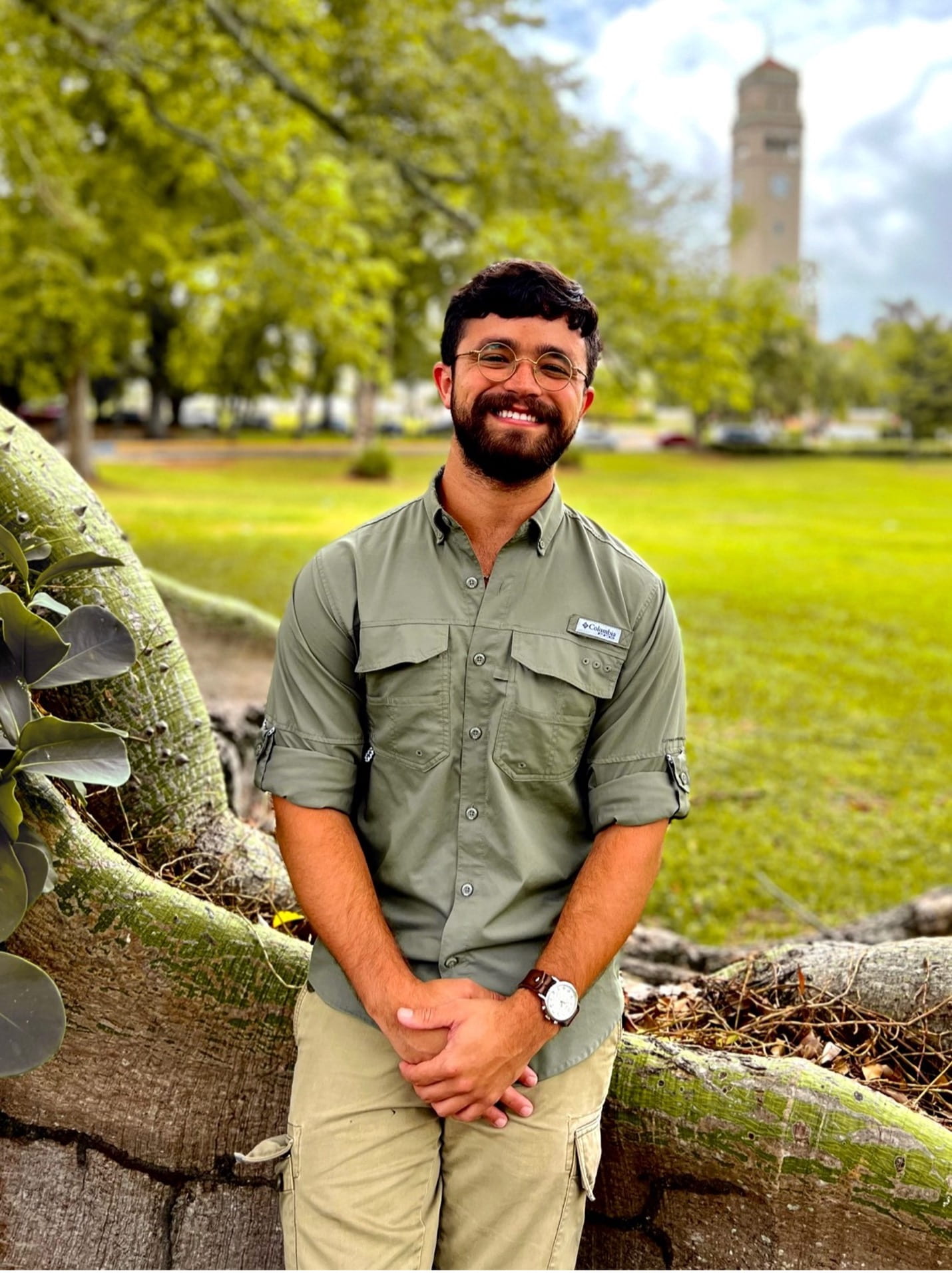
About the Author
Kenismael Santiago-Pagán is a first-generation graduate student, researcher, designer, and educator form Bayamón, Puerto Rico. Trained in Architecture, he also holds a Master in Design Studies with a concentration in Risk and Resilience from Harvard’s Graduate School of Design. His research interest lies in the intersection between the politics of space, urbanization, state produced risks and competing sovereignties over contested land in the Caribbean.
Acerca del Autor
Kenismael Santiago-Pagán es un estudiante graduado de primera generación, investigador, diseñador, y educador de Bayamón, Puerto Rico. Formado en Arquitectura, también tiene una Maestría en Estudios de Diseño con concentración en Riesgo y Resiliencia de la Escuela Graduada de Diseño de Harvard. Su interés de investigación radica en la intersección entre las políticas del espacio, la urbanización, los riesgos producidos por el estado y las soberanías que compiten sobre la tierra en disputa en el Caribe.
Alternative Sovereignties?
Gastro-Politics of Space in Puerto Rico
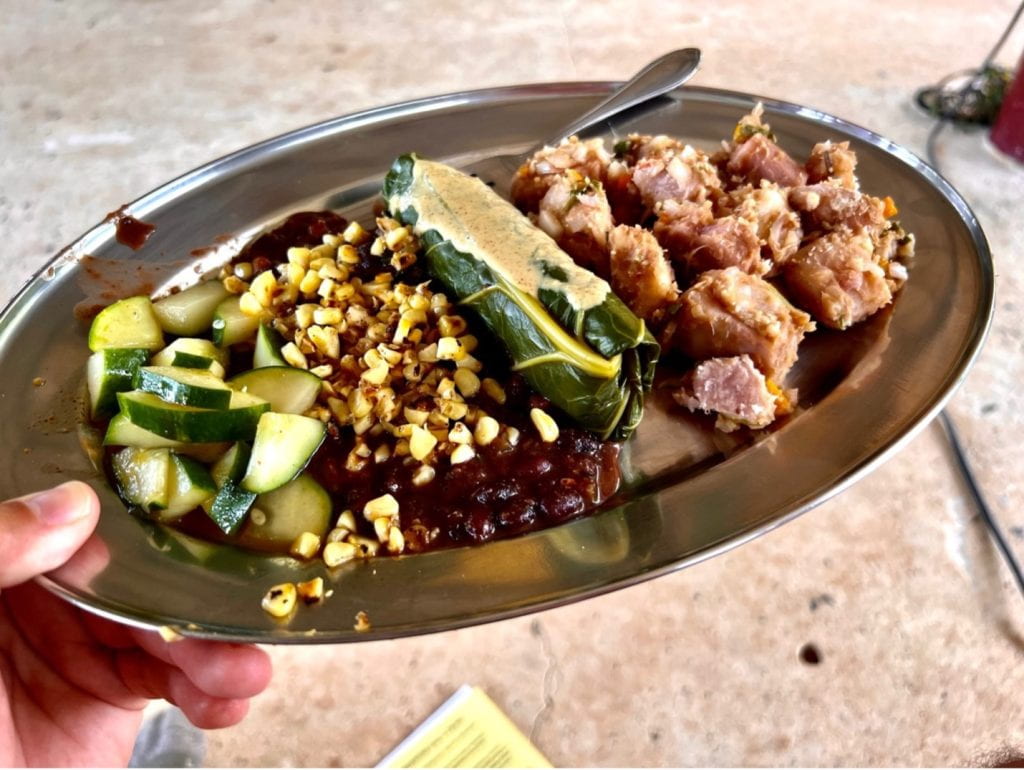
Plate of food with 100% organic local products at Plenitud. Photo courtesy of Kenismael Santiago-Pagán
There’s something about being away from home that have always made me feel incomplete and guilty. As a graduate student, searching for ways and paths to connect with my Puerto Rican community have always been a challenge. I think it has to do with a profound sense of longing for something we don’t have yet. Our sovereignty has always been rendered out of our sight for years, along with a secure path to walk the talk. The capacity that we’ve had to govern our land and food has always been compromised to the will of the Congress of the United States of America. As I sit in A Flight of Hope, on this Air Bus, I ask myself, how do we walk if there is no path?
As a designer and researcher who is interested in the politics of space, I am forced to understand land as something much more than just soil—It’s property, a number, a zoning regulation, a use, a code, a boundary, a rule and many other things that makes it susceptible to neoliberal-capitalist forces. If we take a critical stance to the notion of Food Sovereignty using Puerto Rico as an example, we begin to unpack many layers of ongoing environmental and urban violence in the region. Resulting in measures that have coercively distanced the Puerto Rican community from their land and the capacity of its agrarian development. Harvard’s David Rockefeller Center for Latin American Studies Puerto Rico Winter Institute offered an opportunity for us participants to re-define the means and ways in which a return to the land is possible.
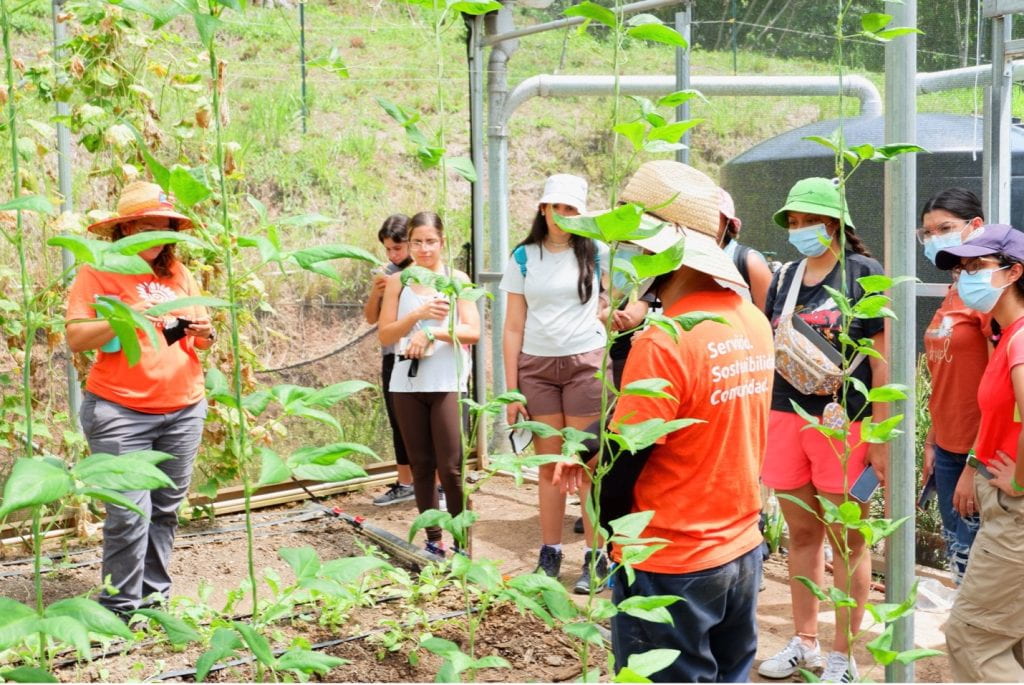
Site visit at Plenitud. Photo courtesy of Pedro Reina Pérez
Suddenly a gap between institutions was bridged and I found myself in my old Alma Mater—The University of Puerto Rico, Rio Piedras campus, the first educational center on the island. Surrounded by Flamboyanes and Ceibas I was able to realize a few key takeaways of the PRWI experience. When a country can satisfy its food needs from its own domestic production, it inevitably reveals the capacity of the [un]limited authority to govern itself, according to many scholars. Trade rules also enable countries to maximize the benefits of food self-sufficiency while minimizing the risks associated with the restriction and excessive reliance on trade. However, being able to produce enough food for a country’s residents—instead of importing it—is not the same as food sovereignty. Food security does not distinguish where food comes from, or the conditions under which it is produced and distributed. Nevertheless, food sovereignty promotes community control of these productive resources. Here in Puerto Rico, the story of food sustenance is the story of our colonial condition. Almost 85% of the food is imported as a result of the Jones Act, a U.S-imposed protectionist law on coastal trade. I can’t help but wonder, what kind of actions can we take to increase food production and reach food sovereignty in Puerto Rico?
Upon the union of concepts like Agro and Cultrue, we combined, theory and practice throughout the seminar. We had the opportunity to delve into many ways of working the land, ranging from agroecology, permaculture, rainwater collection, agrobotany, and bioconstruction. We visited initiatives in Aguadilla, Lares, Las Marías, Cabo Rojo, Güánica, Cayey, Carolina and San Juan. In Plenitud we learned about the fundamentals of permaculture design. An approach to land management that derives from empirical research of the natural ecosystem to optimize the arrangement of the land by zoning it in the most productive way possible. In Hacienda Jeanmarie, we were introduced to the cacao industry within the permaculture principles. While there, Don Juan told us about his initiative Projecto Pais, an initiative that encourages farmers to think collectively from designing where the crop begins to grow, all the way to deciding how it is going to be marketed.
Colectivo Agroecologico Guaikiá taught us about cooperative farming and polyculture principles, which consists of planting several kinds of crops species on the same piece of land at the same time. This effort tries to replicate the diversity found in the natural ecosystem while operating to the benefit of local community members rather than outside investors. From Produce we learned about innovative ways to connect Puerto Rican producers with consumers who want to know more about what they are eating, and where it comes from. Buying 100% local, keeps everything fresh and it facilitates strategies to deliver that which comes out of the ground right to the doorstep of each costumer. In Hogar Habitat Semilla we learned about the challenges of building with the land and use of natural resources provided in the very site in which the intervention is going to be placed. From El pretexto we learned combining culinary farm lodge initiatives offering a farm-stay with an educational agroecological farming experience. This strategy could change completely the view that we have from current tourism towards a more culturally sound agrotourism.
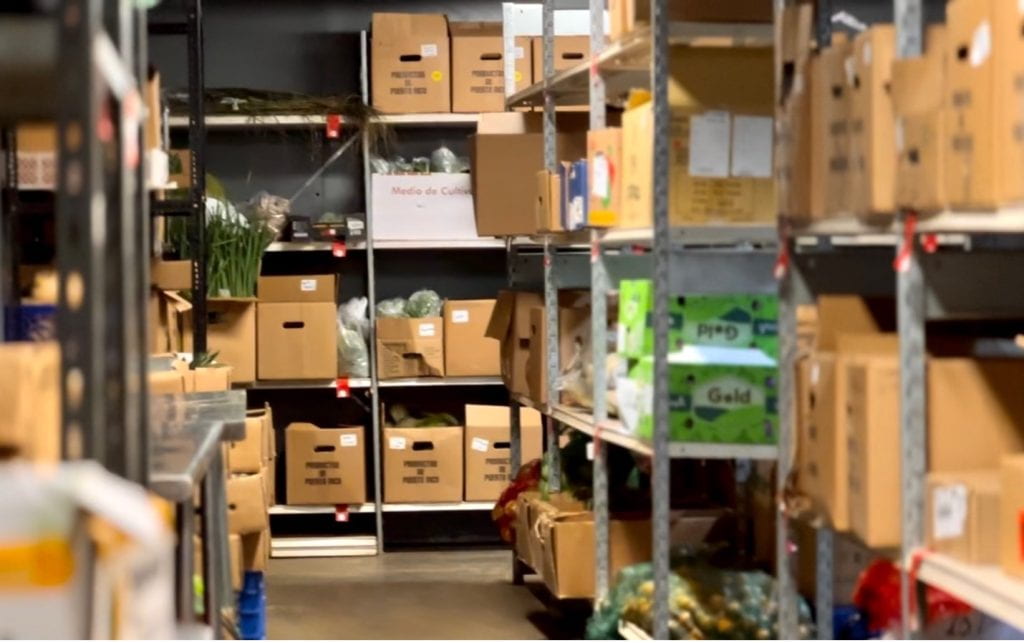
Visit to Produce headquarters. Photo courtesy of Kenismael Santiago-Pagán
All these initiatives have been working towards expanding their outreach by generating a strong and solid market of food sustainability where they govern what type of products they want to develop for an autonomous and healthy diet. However, the problem is still there. As a result, we found that the notion of resilience falls short because of the government’s systematic resistance to provide necessary infrastructure and regulations to enable stronger bonds among land workers. According to agronomist colleagues, if these initiatives enjoyed the appropriate policies and legal framework, a network of cooperatives and resilient centers could prioritize the collaboration of all the island’s land workers. This organized effort could massively lower the costs of purchasing imported products, as well as increasing agricultural products from the island. It would facilitate opportunities to create Community Land Trust’s that are exclusively focused on agrarian development. The collective ownership of land and food sustainability across the archipelago could help us perceive land as a common good and not as an individual pursuit. Which brings me to my next point: the power in place of Puerto Rico.
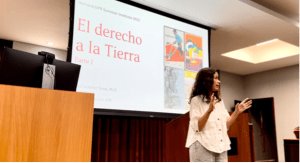
Professor Erika Fontánez Torres delivering her lecture. Photo courtesy of Kenismael Santiago-Pagán
It wasn’t all visiting projects. Academic lectures examined the notion of land as object of capitalist exploitation and speculative individual ownership, as well as a source of food production. Professor Erika Fontánez Torres, who is also a lawyer, spoke to me the most with her lectures. I learned that in Puerto Rico, a 1941 Ley de Tierras created La Autoridad de Tierras, which established the conditions for initiating an agrarian reform. The central objectives were distributing land to farmers’ families; training in agricultural methods and establishing farms that would function as cooperatives. However, although it promoted the diversification of agriculture to abandon sugarcane monoculture, it ended up producing just that but at a smaller scale. Economically sound but culturally disproportionate, the reform replicated an individualistic approach where land was defined and justified by a distributive reproductive capacity that ended up decreasing its very collective efficiency. Every household knew how to maintain its immediate planting. Land was perceived as a personal good but never as a common one, until now. Is it possible to see the right to the land as common good while challenging its current form of individual ownership?
Those lectures made me think: Nation, state, infrastructure, owners, workers, benefactors, and stakeholders are only some of the levels we must analyze to see if the land is being managed the best way possible and whether it can become a common good. Who owns the land and how it was acquired? Should every citizen have a right to a plot of land? Should there be a cap in how many plots of lands one can own and speculation in prices? Should there be a regulation for unconscionable developments by the state and private sector alike? How should we address food sovereignty, environmental changes, precarity, and vulnerability when politics are so unstable? These are just some of the questions that put at the forefront the core conflict in Puerto Rico, the power in place and the external forces that shape the modern permanence of coloniality. If we never address these questions, we could be making steps towards the right direction until we don’t. Only to realize we have fell into an orchestrated trap and remain a colonial experiment forever.
As a result of the seminar, I noticed a point of contention in the relationship between food and space. In this case, the space being the land in which food gets produced. Coined by Arjun Appadurai, the term Gastro-politics implies definite conflict or competition arising through the medium of social transactions around food. When it comes to food sustenance, such social transactions in Puerto Rico have been hindered by measures like the Jones Act and La Autoridad de Tierras, by raising its value and creating uncertainty around land repartition. Accompanied by public policies that do not help the land worker, the development of food sovereignty in Puerto Rico seems to be at risk.
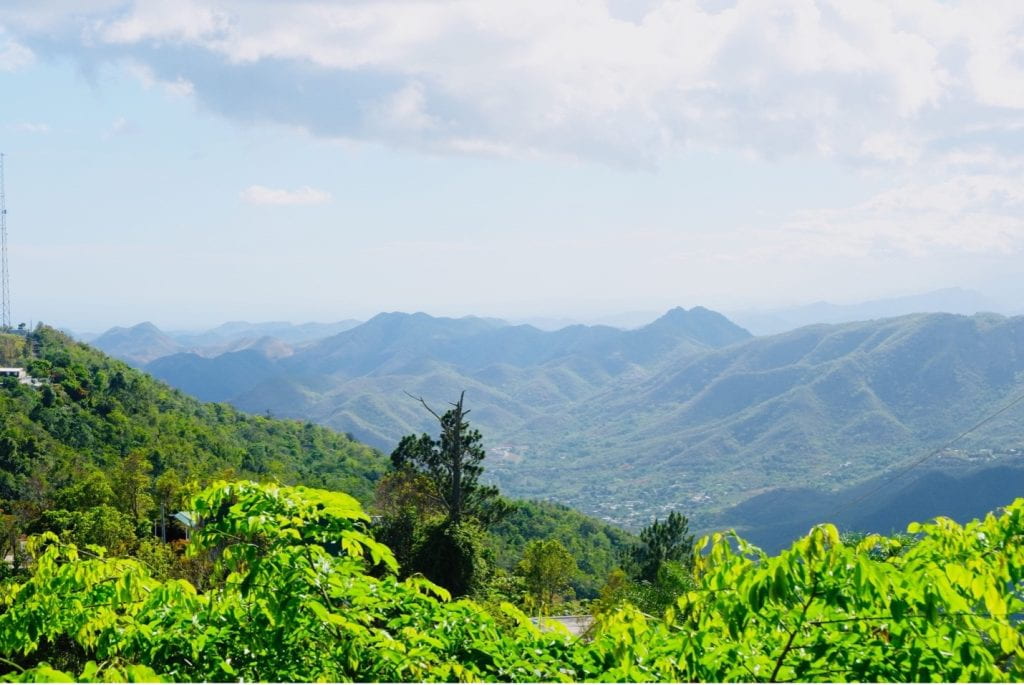
View of Cayey, Puerto Rico. Photo courtesy of Pedro Reina Pérez
If food sovereignty is the right of Puerto Ricans to healthy and culturally appropriate food, produced through ecologically sound and sustainable methods, and their right to define and govern their own food and agriculture systems, then inevitably the discussion becomes about land sovereignty. I’ve learned that a disciplinary call to action is most pertinent. Critical practice in the discipline of design, architecture and urban planning shaped the current built environment and land distribution without paying attention to power players and socio-political tensions over land. Aiming to have a clear understanding of the gastro-politics of space in Puerto Rico, this call to action must be one that involves changes to policies and acts that have long prolonged an ongoing colonial system. It should be a practice that instead of building things, would be focused on designing an interplay of procedures. We must also examine on every level the nature of the public/private binary over land and who gets to benefit from it.
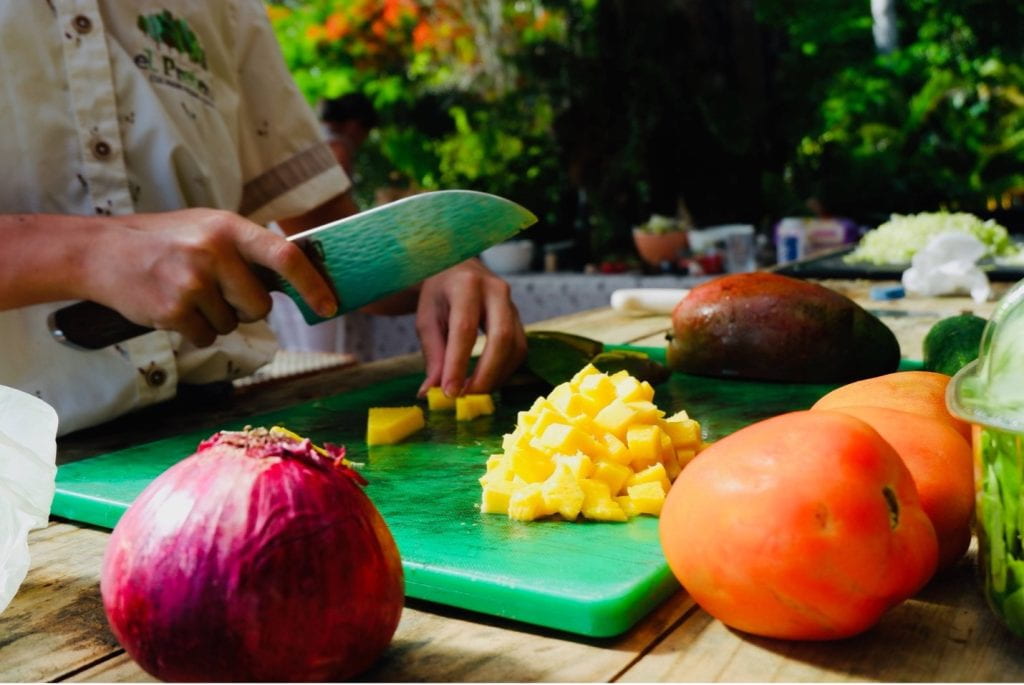
El Pretexto. Photo courtesy of Pedro Reina Pérez
In a recent local newspaper article, Farmer Marissa Reyes from Colectivo Güakiá observes, “The system is designed for farmers to fail and if we want to produce food in Puerto Rico, it must listen to those who produce it.” Otherwise, we will end up having an archipelago where “public policies, and in particular that of agriculture, chain small farmers to a cycle of poverty,” Katia Avilés, director of the Institute for Agroecology, suggests. Co-founder and executive director of the first agricultural community land trust (ACLT) in Puerto Rico, Mariolga Reyes Cruz, lectured on how ACLT’s could work as an ecofeminist exit response to multiple crises. Reyes Cruz also produced a documentary film showing three years in the lives of Stephanie, Ian and Alfredo, young organic farmers without their own farm, in their efforts to live off farm work by producing food for local consumption. The documentary Seran Dueñas de la Tierra demonstrates how, after Hurricane Maria, these farmers received eviction orders from government’s Autoridad de Tierras, for not being able to pay their rent without providing a safety net for them to relocate under the excuse that the land would be put to a better use. But which use?
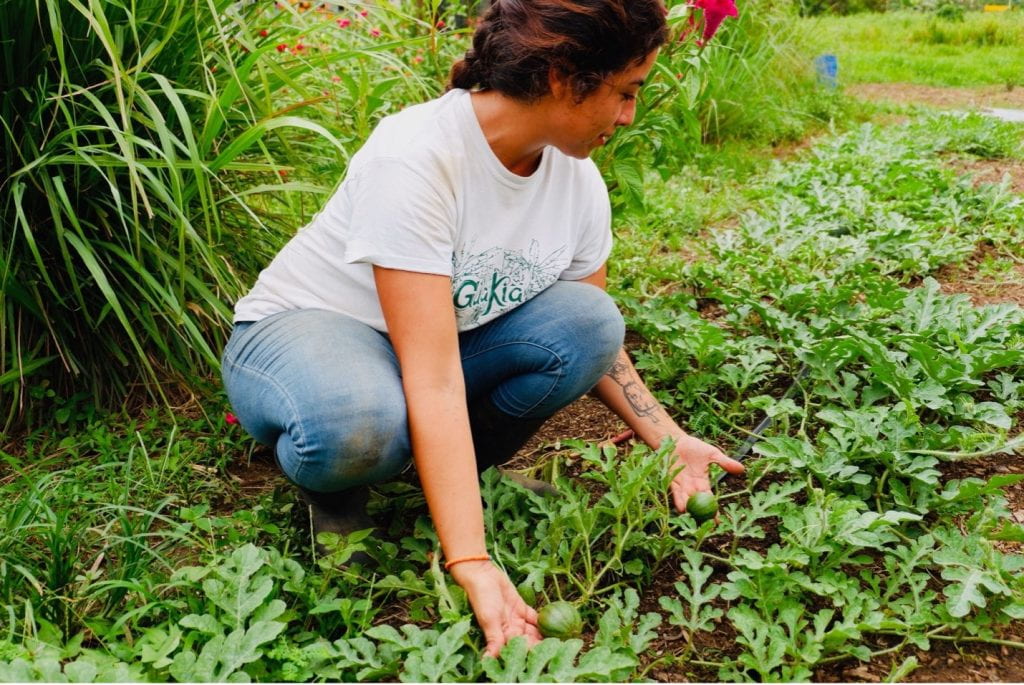
Colectivo Agroecológico Güaikía. Photo courtesy of Pedro Reina Pérez
Systems must be designed prioritizing those who are native to the land, unlike measures like Act 60, a policy that favors the foreigner while providing tax exemptions for them. Food Sovereignty presents itself as a way to re-define and acknowledge an active return to the land fostered through the creation of public policies that truly help the workers of our land. This return to the land is not just about a corporeal re-connection to the soil, that has been lost to the highest bidder. In Puerto Rico, it has a different meaning. What Professor Pedro Reina Pérez means by this statement goes far beyond the physical realm. It means to have a critical stance towards the policies that have not worked before and from there re-define what the center of land sustenance means in Puerto Rico. Yet, this return must also come with a robust financially equitable support as a reparation mechanism that could harness mutually beneficial land co-stewardship and agrarian cooperative strategies as part of decolonial collective futures. Both, in the island and in the diaspora, we often find ourselves anxious about the lack of available paths make changes… But if there is not a path, we make one—one that is made to the beating sound of our firm steps as we move onward towards our own land.
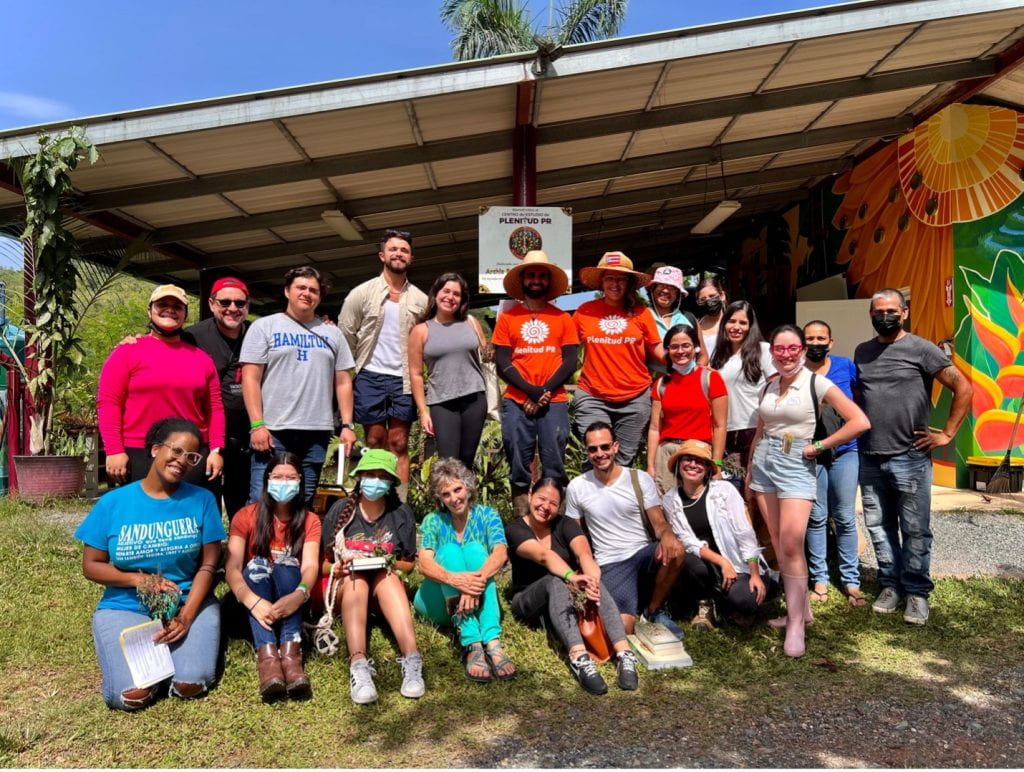
Puerto Rico Summer participants. Photo courtesy of Kenismael Santiago-Pagán
Soberanías Alternas?
Gastro-Políticas del Espacio en Puerto Rico
Por Kenismael Santiago-Pagán

Plato de comida echo con productos locales 100% orgánicos en Plenitud. Imagen, cortesía de Kenismael Santiago-Pagán
Hay algo de estar fuera de casa que siempre me ha hecho sentir incompleto y culpable. Como estudiante graduado, buscar maneras y caminos para conectar con mi comunidad Puertorriqueña siempre ha sido un reto. Creo que eso tiene que ver con un profundo sentido de nostalgia por algo que un no tenemos. Nuestra soberanía siempre ha estado siempre ha quedado fuera de nuestra vista por muchos años, en conjunto con un camino seguro para caminar la tertulia. La capacidad que hemos tenido de gobernar nuestra tierra y alimento siempre ha estado comprometida a la voluntad del Congreso de los Estados Unidos de América. Mientras me siento en un vuelo de esperanza en esta Guagua Aerea, me pregunto, ¿Como se camina cuando no hay camino?
Como diseñador e investigador interesado en las políticas del espacio, he sido forzado para entender la tierra como algo mucho más allá que un suelo—es propiedad, un número, una regulación de zona, un uso, un código, un límite, una regla y muchas otras cosas que hace que la tierra sea susceptible a las fuerzas capitalistas-neoliberales. Si tomamos una postura crítica a la noción de Soberanía Alimentaria usando a Puerto Rico como ejemplo, comenzamos a revelar los distintos niveles de la constante violencia ambiental y urbana en la región. Resultando en medidas coerción que han distanciado a la comunidad Puertorriqueña de su tierra y de la capacidad de su desarrollo agrario. El seminario Puerto Rico Winter Institute del David Rockefeller Center for Latin American Studies de la Universidad de Harvard ofreció una oportunidad, a nosotros los participantes, para re-definir las diferentes maneras en que un retorno a la tierra es posible.

Visita a Plenitud. Imagen, cortesía de Pedro Reina Pérez
De momento, una distancia entre instituciones fue conectada y una vez más me encontraba en mi vieja Alma Mater—La Universidad de Puerto Rico, Recinto de Rio Piedras, el primer centro docente de la isla. Entre Flamboyanes y Ceibas pude internalizar puntos clave sobre mi experiencia en el PRWI. De acuerdo con muchos académicos, cuando un país puede satisfacer sus necesidades de alimento desde su misma producción local, inevitablemente revela la capacidad de su autoridad [i]limitada para gobernarse así mismo. Las normas comerciales también permiten a los países maximizar los beneficios de la autosuficiencia alimentaria al mismo tiempo que minimizan los riesgos asociados con la restricción y la dependencia excesiva del comercio. Sin embargo, ser capaz de producir suficientes alimentos para los residentes de un país, en lugar de importarlos, no es lo mismo que la soberanía alimentaria. La seguridad alimentaria no distingue de dónde provienen los alimentos ni las condiciones en las que se producen y distribuyen. No obstante, la soberanía alimentaria promueve el control comunitario de estos recursos productivos. Aquí en Puerto Rico, la historia del sustento alimentario es la historia de nuestra condición colonial. Casi el 85% de los alimentos se importan como resultado de la Jones Act, una ley proteccionista impuesta por el gobierno de los Estados Unidos sobre el comercio costero. Ante esto, no puedo evitar preguntarme, ¿qué tipo de acciones podemos tomar para aumentar la producción de alimentos y alcanzar la soberanía alimentaria en Puerto Rico?
Ante la unión de los conceptos Agro y Cultura, combinamos teoría y practica mientras a través de todo el seminario. Tuvimos la oportunidad de profundizar en muchas formas de trabajar la tierra, que van desde la agroecología, la permacultura, la recolección de agua de lluvia, la agrobotánica y la bioconstrucción. Visitamos iniciativas en Aguadilla, Lares, Las Marías, Cabo Rojo, Güánica, Cayey, Carolina y San Juan. En Plenitud aprendimos sobre los fundamentos del diseño de la permacultura. Un enfoque de la gestión de la tierra que se deriva de la investigación empírica del ecosistema natural para optimizar la disposición de la tierra mediante la zonificación de la misma, de la manera más productiva posible. En Hacienda Jeanmarie, nos introdujimos en la industria del cacao dentro de los principios de la permacultura. Allí, Don Juan nos habló de su iniciativa Projecto Pais, una iniciativa que motiva a los agricultores a pensar colectivamente desde el diseño de dónde comienza a crecer el cultivo, hasta decidir cómo se va a comercializar.
El Colectivo Agroecologico Guaikiá nos enseñó sobre la agricultura cooperativa y los principios del policultivo, que consiste en sembrar varios tipos de especies de cultivos en el mismo pedazo de tierra al mismo tiempo. Este esfuerzo trata de replicar la diversidad que se encuentra en el ecosistema natural mientras opera en beneficio de los miembros de la comunidad local en lugar de los inversores externos. De Produce aprendimos sobre formas innovadoras de conectar a los productores puertorriqueños con los consumidores que quieren saber más sobre lo que están comiendo y de dónde viene. Comprar 100% local, hace que todo permanezca fresco y facilita las estrategias para entregar lo que sale del suelo justo a la puerta de cada cliente. En Hogar Hábitat Semilla conocimos los retos de construir con el propio suelo y uso de los recursos naturales previstos en el mismo sitio en el que se va a ubicar la intervención. De El pretexto aprendimos a combinar iniciativas culinarias de farm lodge que ofrecen una estadía en la finca con una experiencia educativa agroecológica. Esta estrategia podría cambiar por completo la visión que tenemos del turismo actual hacia un agroturismo culturalmente más sólido.

Visita a Produce. Imagen, cortesía de Kenismael Santiago-Pagán
Todas estas iniciativas han venido trabajando para ampliar su alcance generando un mercado más fuerte y sólido de sostenibilidad alimentaria donde se gobierne sobre qué tipo de productos se desean desarrollar para una alimentación autónoma y saludable. Sin embargo, el problema sigue ahí. Como resultado del seminario, encontramos que la noción de resiliencia se queda corta debido a la resistencia sistemática del gobierno a proporcionar la infraestructura y las regulaciones necesarias para permitir vínculos más fuertes entre los trabajadores de la tierra. Según colegas agrónomos, si estas iniciativas gozaran de las políticas y el marco legal adecuado, una red de cooperativas y centros resilientes podría priorizar la colaboración de todos los trabajadores de la tierra de la isla. Este esfuerzo organizado podría reducir enormemente los costos de productos importados, así como aumentar los productos agrícolas de la isla. Facilitaría también, las oportunidades para crear Fideicomisos de Tierras Comunitarias que se centren exclusivamente en el desarrollo agrario. La propiedad colectiva de la tierra y la sostenibilidad alimentaria en todo el archipiélago podrían ayudarnos a percibir la tierra como un bien común y no como una búsqueda individual. Lo que me lleva a mi siguiente punto: el poder en lugar de Puerto Rico.

Profesora Erika Fontánez Torres ofreciendo su conferencia. Imagen, cortesía de Kenismael Santiago-Pagán
No todo fue visitar proyectos. Conferencias académicas examinaron la noción de la tierra como objeto de explotación capitalista-neoliberal y propiedad individual especulativa, así también como una fuente de producción de alimentos. La profesora Erika Fontánez Torres, que también es abogada, fue la que más me habló a través sus conferencias. Aprendí que, en Puerto Rico, una Ley de Tierras del 1941 creó La Autoridad de Tierras, que estableció las condiciones para iniciar una reforma agraria. Los objetivos centrales eran distribuir la tierra a las familias de los agricultores; capacitación en métodos agrícolas y establecimiento de granjas que funcionarían como cooperativas. Sin embargo, aunque promovió la diversificación de la agricultura para abandonar el monocultivo de caña de azúcar, terminó produciendo precisamente eso, pero a menor escala. Económicamente sólida pero culturalmente desproporcionada, la reforma replicó un enfoque individualista donde la tierra estaba definida y justificada por una capacidad reproductiva distributiva que terminó disminuyendo su propia eficiencia colectiva. Cada hogar sabía cómo mantener su siembra inmediata. La tierra era percibida como un bien personal, pero nunca como uno común, hasta ahora. ¿Es posible ver el derecho a la tierra como un bien común mientras se desafía su forma actual de propiedad individual?
Esas conferencias me hicieron pensar: Nación, estado, infraestructura, propietarios, trabajadores, benefactores y partes interesadas son solo algunos de los niveles que debemos analizar para ver si la tierra se está administrando de la mejor manera posible y si puede convertirse en un bien común. ¿Quién es el dueño de la tierra y cómo fue adquirida? ¿Debería todo ciudadano tener derecho a una parcela de tierra? ¿Debería haber un límite en la cantidad de parcelas de tierra que uno puede poseer y especular en los precios? ¿Debería haber una regulación para los desarrollos desmesurados por parte del estado y el sector privado por igual? ¿Cómo debemos abordar la soberanía alimentaria, los cambios ambientales, la precariedad y la vulnerabilidad cuando la política es tan inestable? Estas son solo algunas de las preguntas que ponen en primer plano el conflicto central en Puerto Rico, el poder en el lugar y las fuerzas externas que dan forma a la permanencia moderna de la colonialidad. Si nunca abordamos estas preguntas, podríamos estar dando pasos hacia la dirección correcta hasta que no lo hagamos. Solo para darnos cuenta de que hemos caído en una trampa orquestada y permanecer como un experimento colonial para siempre.
Como resultado del seminario, noté un punto de contención en la relación entre la comida y el espacio. En este caso, el espacio es la tierra en la que se producen los alimentos. Acuñado por Arjun Appadurai, el término Gastro-política implica un conflicto o competencia definida que surge a través de las transacciones sociales en torno a los alimentos. Cuando se trata de sustento alimentario, tales transacciones sociales en Puerto Rico se han visto obstaculizadas por medidas como la Ley Jones y La Autoridad de Tierras, al aumentar su valor y crear incertidumbre en torno a la repartición de tierras. Acompañado de políticas públicas que no ayudan a aquellos que trabajan la tierra, el desarrollo de la soberanía alimentaria en Puerto Rico parece estar en riesgo.

Vista de Cayey, Puerto Rico. Imagen, cortesía de Pedro Reina Pérez
Si la soberanía alimentaria es el derecho de los puertorriqueños a alimentos saludables y culturalmente apropiados, producidos a través de métodos ecológicamente racionales y sostenibles, y su derecho a definir y gobernar sus propios sistemas alimentarios y agrícolas, entonces inevitablemente esta discusión se convierte en una sobre la soberanía de la tierra. He aprendido que un llamado disciplinario a la acción es lo más pertinente sobre este asunto. La práctica crítica en la disciplina del diseño, la arquitectura y la planificación urbana dio forma al entorno construido actual y la distribución de la tierra sin prestar atención a los actores del poder y las tensiones sociopolíticas que existen sobre la tierra. Con el objetivo de tener una comprensión clara de la gastro-política del espacio en Puerto Rico, este llamado a la acción debe ser uno que implique cambios en las políticas públicas y leyes que han prolongado durante mucho tiempo un sistema colonial en curso. Debería ser una práctica que, en lugar de construir cosas, se centrara en diseñar una interacción de procedimientos. También incluyendo examinar en todos los niveles, la naturaleza del binario público/privado sobre la tierra y quiénes realmente se benefician de ella.

El Pretexto. Imagen, cortesía de Pedro Reina Pérez
En un reciente artículo de un periódico local, la agricultora Marissa Reyes del Colectivo Güakiá observa: “El sistema está diseñado para que los agricultores fracasen y si queremos producir alimentos en Puerto Rico, debe escuchar a quienes los producen”. De lo contrario, acabaremos teniendo un archipiélago donde “las políticas públicas, y en particular la de la agricultura, encadenan a los pequeños agricultores a un ciclo de pobreza”, sugiere Katia Avilés, directora del Instituto de Agroecología. La cofundadora y directora ejecutiva del primer fideicomiso de tierras comunitarias agrícolas en Puerto Rico, Mariolga Reyes Cruz, dio una conferencia sobre cómo los fideicomisos de tierras comunitarias agrícolas podrían funcionar como una respuesta ecofeminista de salida a múltiples crisis. Reyes Cruz también produjo un documental que muestra tres años en la vida de Stephanie, Ian y Alfredo, jóvenes agricultores orgánicos sin su propia granja, en sus esfuerzos por vivir del trabajo agrícola mediante la producción de alimentos para el consumo local. El documental Serán Dueñas de la Tierra demuestra cómo, después del huracán María, estos agricultores recibieron órdenes de desalojo de la Autoridad de Tierras del gobierno, por no poder pagar su alquiler sin proporcionar una red de seguridad para que se reubicaran bajo la excusa de que la tierra sería puesta a un mejor uso. ¿Pero cuál uso?

Colectivo Agroecológico Güaikía. Imagen, cortesía de Pedro Reina Pérez
Los sistemas deben diseñarse priorizando a aquellos que son nativos de la tierra, a diferencia de medidas como la Ley 60, una política que favorece al extranjero al mismo tiempo que proporciona exenciones fiscales y contributivas para ellos. La Soberanía Alimentaria se presenta como una forma de redefinir y reconocer un retorno activo a la tierra fomentado a través de la creación de políticas públicas que realmente ayuden a los trabajadores de nuestra tierra. Este retorno a la tierra no se trata solo de una reconexión corporal con el suelo, que se ha perdido ante el mejor postor. En Puerto Rico, tiene un significado diferente. Lo que el profesor Pedro Reina Pérez quiere decir con esta afirmación va mucho más allá del ámbito físico. Significa tener una postura crítica hacia las políticas públicas que no han funcionado antes y a partir de ahí redefinir lo que significa el centro del sustento de la tierra en Puerto Rico. Sin embargo, este retorno también debe venir con un apoyo sólido y financieramente equitativo como mecanismo de reparación que podría aprovechar la coadministración de la tierra mutuamente beneficiosa y las estrategias de cooperativas agrarias como parte de un futuro colectivo decolonial. Tanto en la isla como en la diáspora, a menudo nos encontramos ansiosos por la falta de caminos disponibles para hacer cambios… Pero si no hay un camino, hacemos uno—uno que este hecho con el sonido palpitante de nuestros pasos firmes a medida que andamos hacia nuestra propia tierra.

Participantes del Verano en Puerto Rico. Imagen, cortesía de Kenismael Santiago-Pagán
More Student Views
Puerto Rico’s Act 60: More Than Economics, a Human Rights Issue
For my senior research analysis project, I chose to examine Puerto Rico’s Act 60 policy. To gain a personal perspective on its impact, I interviewed Nyia Chusan, a Puerto Rican graduate student at Virginia Commonwealth University, who shared her experiences of how gentrification has changed her island:
Beyond Presence: Building Kichwa Community at Harvard
I recently had the pleasure of reuniting with Américo Mendoza-Mori, current assistant professor at St Olaf’s College, at my current institution and alma mater, the University of Wisconsin-Madison. Professor Mendoza-Mori, who was invited to Madison by the university’s Latin American, Caribbean, and Iberian Studies Program, shared how Indigenous languages and knowledges can reshape the ways universities teach, research and engage with communities, both local and abroad.
Of Salamanders and Spirits
I probably could’ve chosen a better day to visit the CIIDIR-IPN for the first time. It was the last week of September and the city had come to a full stop. Citizens barricaded the streets with tarps and plastic chairs, and protest banners covered the walls of the Edificio de Gobierno del Estado de Oaxaca, all demanding fair wages for the state’s educators. It was my first (but certainly not my last) encounter with the fierce political activism that Oaxaca is known for.




